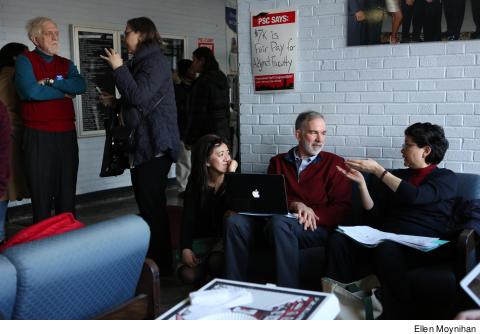A series of local campus actions in public spaces
 |
Amy Larimer, an associate professor of dance, was working on equivalencies for transfer students. Mari Sakaji, an adjunct Japanese language instructor, was grading homework assignments. And Leslie Lieman, an education technology coordinator, was filling out a staff survey about use of official campus data.
These three PSC members at Lehman College joined nearly two dozen of their colleagues on February 13 in the lobby of the college’s main administration building, Shuster Hall, in what was the first of many “work-ins,” where union members at Lehman work in public spaces to make visible their labor. With campus safety officials – both in uniform and in plain clothes – looking on, the union demonstration was meant to show the administration and the public how much work CUNY faculty and staff do each and every day.
INVISIBLE WORK
Similar actions, called “grade-ins,” where faculty members grade assignments in public areas on campus, also took place at Baruch College, Bronx Community College, City College, Queens College, Brooklyn College, City Tech and Borough of Manhattan Community College.
The actions are a part of the union’s escalation of the contract campaign. Far too often, members said, the faculty and staff’s work goes unseen. Yes, they said, it’s well known what happens in the classroom, but what’s not so well known are the hours faculty and staff put in every day outside of class time – responding to emails, grading, attending meetings, etc. Work-ins such as these are meant to demystify academic labor.
“It represents what we’re doing; we’re not asking for something for nothing – we need the resources to do our work,” said Larimer.
Lieman, with her laptop open in Shuster Hall, while periodically communicating with fellow HEOs passing by about equipment maintenance, said, “It was unacceptable for it to take six years to reach the last contract. And now it’s already one year of ‘no contract.’ Adjunct and full-time faculty, HEOs and CLTs work incredibly hard on behalf of our students. We deserve a contract now.”
Work-ins are not a new tactic in the pedagogical labor movement. As part of the Occupy Wall Street movement, rank-and-file United Federation of Teachers members read homework assignments in Zuccotti Park to show how much work teachers do after students leave school in the afternoon. PSC members at Brooklyn College held a grade-in late last year.
ORGANIC SOLIDARITY
For James Davis, the PSC chapter chair at Brooklyn College who helped organize two grade-ins on that campus, one of the powers of the tactic was internal solidarity building – unlike rallies, he said, there is no speaker leading a crowd, but rather rank-and-file members socializing and meeting each other.
“The first one we did at Brooklyn College got some coverage in a local paper, and they get picked up on social media. Of course we want that, but it’s useful for people to feel empowered because they feel visible and feel seen,” Davis told Clarion. “It appeals to different people than the noisy rally. It’s a different mode of expressing militancy, just to be collectively out there, taking up space, I think, makes an important statement and it does allow people to trade stories or turn to their neighbor and have conversations.”
For Lieman, an expected rise in enrollment at the campus would mean more work for faculty and staff that should be met with wage increases. “This action is aimed at the administration, especially for adjuncts, whose salaries are simply not a living wage in New York,” Lieman said. “It’s about the impact of the growth in student enrollment. It’s most visible impact is in the classroom, but HEOs feel the impact, too.”
ESCALATING CAMPAIGN
Both full-timers and part-timers highlighted the demand for $7K for adjuncts, who are currently paid well below what adjuncts at peer institutions earn.
Amel Derras-Chouk, an adjunct physics instructor at Lehman and a PhD student at the Graduate Center, told Clarion, “It shows we care, that we’re not interested in ‘not working.’ It’s an action that’s aimed at who makes the decisions at CUNY, the people who make the decision not to pay us.”
Kamran Moshref, an adjunct political science instructor at Lehman and a Graduate Center student, said, “The only way to get $7K is to organize and mobilize. It’s about visibility in the workplace. For the administration, it’s just a reminder that we’re here. Things will probably escalate from here, each action we do is a step toward something larger and more ambitious. I hope the administration sees this as a reminder of how CUNY can’t function without adjuncts.”

